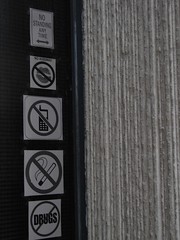A few days ago, that Blue Skunk dude, Doug Johnson, published a blog post resulting from a conversation he was involved in with the fellow leadership of his school district. The question at hand was, “How can middle school and high school library programs and facilities be improved to support student learning and achieve the ISB Vision for Learning?” However, through the course of the conversation, the question morphed into, “Does a school need a library when information can be accessed from the classroom using Internet connected laptops?”
Well I can think of no one, NO ONE, whom I would rather be sitting in the presence of such a question. If this statment puzzles or intrigues you then just google [“Doug Johnson” librar]. Johnson also offered up a list of published articles he has written about the essential need for libraries today. Go to his blog post (The Essential Question?) to see this list — and bookmark the articles.
Part of his blog entry was a request for answers.
The new question is uncomfortable, messy, and incredibly important and not restricted by any means to one particular school. It is one to which all library people need a clear and compelling answer.
Then he closed with,
Do you have a good response? What part does a facility play in a ubiquitous information environment? How does the librarian’s role change? How do we assess our impact if physical visits become less frequent?
This blog post — which you are reading now — comes under the category of, “I spent so much time and energy writing that comment that I have to put it someplace else as well.” So here’s how I answered Doug’s question. (Italicized text was added for this article)
Doug,
I think that this is one of the most interesting questions in education today, “Why do we need libraries (or librarians) when virtually all of the information we need on a daily basis is only a mouse-click away?”
I ask the question a lot, and the answers often seem to fall into two categories. The first is about books and their special place in our culture. Why? The answers frequently seem to be personal (I like the feel and smell). The second reason is about librarians. We need librarians to teach students how to be critical users of information — and much more.
Frankly, I do not believe that either reason will fly in the face of budget cuts and an increasingly information-ubiquitous landscape.
That said, I also do not believe that there has ever been a more exciting time to be a librarian. Reinvention thrills me.
The traditional vision of the library portrays a place, where you go to consume content, to find information, read information, and sometimes to check it out. Certainly many, if not most, libraries have extended beyond this limited function. Yet the vision continues to be the same.
As you know, I talk about literacy a lot, and try to tie it to the old and recognized structure of the 3Rs. I think it’s a good place to start, because it is about accessing, working, and expressing information (reading, arithmetic, & writing). It seems that if the library could come to be seen as a place for all three…
- Find, access, understand, critically evaluate the appropriate information for your goal;
- Add value to the information by utilizing tools of analysis, translation, manipulation, and visualization of information;
- Compelling express ideas through the appropriate combinations of text, sound, images, video, animation; and
- Accomplish these things socially, collaboratively, and joyously.
…if the library might come to be seen more as a workshop where information isn’t so much a product, as it is a raw material (a “Kinkos for kids,” if you will), then it may remain not only viable, but an essential institution.
That’s my 2¢ Worth.
Again, go read Dougs post to see many other responses.

Powered by ScribeFire.





A few more cents-
As a librarian (media specialist), or information specialist (my preference), I see my role as similar to a sand dune, on a beach, during a storm. Many of the traditional responsibilities remain and must be maintained inspite of the wind and waves of change. In turn, the wind and waves sculpt and reform the sand dune.
I too, value books. There is no greater feeling than being “lost”, suspended in time, in the pages of a book. Students (All of us) need to experience that transportation to balance the “on demand” world in which we live. Enough about books…
As an “information specialist”, I guide, persuade, and gently coerce all who I come in contact with, to become consumers and producers of information in all its varied forms. In response to your question, “Why do we need libraries (or librarians) when virtually all of the information we need on a daily basis is only a mouse-click away?”; information maybe a mouse-click away but the skills and understandings needed to manipulate and synthesis information are not innate. The information, skills, and tools are not static. Teachers are overloaded. Time is stretched thin. Some one must “drive” the storm as the sand dunes are reformed. That is my passion!
A great reply. It’s funny that this topic is being discussed now. There was a great article on the Huffington Post on May 8, 2009 by Kenneth Davis: http://tiny.cc/rF3wC called “Libraries are America’s Lifeline. Leave them Alone.” It seems that Mayor Bloomberg is planning to cut funding for the NYC public libraries. Mr. Davis gives some great reasons why public libraries are important.
Thanks for this post. It comes at the perfect time for me. Feeling a little cognitive dissonance after getting accepted into school library media training and keep reading about school libraries that are ditching books for more computers.
After reading your post I am reinspired. It is an exciting time to be a librarian, especially a school librarian.
DW
My doctoral student, Mary Ann Harlan, said something about technology that I think is worth repeating and thinking about. Of technology she says: Just because they can doesn’t me they will, just because they will doesn’t mean they will do so thoughtfully. I think it is significant that no solid connection has been made between technology use in schools and achievement. One of the reasons is that teachers often adopt a technology but use it to do the same old thing. That said, I think there is a deeper issue about school libraries that David brings up. There is a major need to reinvent what school libraries do from the ground up. Much of the old way of doing things is just not relevant any more and our users are telling us that as they Google around us David keeps telling us all about the changed generation but often it’s like the old saying that the geranium on the window sill just died but the teacher went right on. Watching academic libraries starting to reinvent themselves, it has sent me into a major rethinking toward the idea of a learning commons and I am beginning to see more and more conversations about doing. If you care to join the conversation, check out schoollearningcommons.pbworks.com. And, David, keep lifting our sights to an new world where we can turn our kids and teen’s social networking over into enhancing their academic skills.
Hi David,
I agree with all your statements below. I believe the best analogy I’ve heard for a long time about libraries is that we need to stop being information grocery stores and start being information kitchens. Production, not consumption, of information and knowledge will be the consummate skill needed by our kids.
All the best,
Doug
I like it! Very accurate, grocery stores to kitchens. Here’s another:
Not information consumers, but information artisans…
Hi to BOTH Davids,
It is very good to follow this conversation, especially from Brazil. Here as in many other countries we are finally starting to move from reading rooms to school libraries and hopefully will not be bypassed by the computer lab. There is still the need to include the book in a “special place in our culture” and ICT is blooming. So I ask you, how does one “invent” the new school library since there is so little to reinvent. The challenge to plunge into the new is great and awesome is the task. Any suggestions?
Thanks
Katharina Berg
Regional Director of IASL for LA and Car.
Yes, yes, yes! David, thanks for putting into words exactly what I try to accomplish with my students in our library! I am teaching a course this summer to school-library graduate students and will be asking them to read this article and comment (as well as read your book Redefining Literacy 2.0). I hope you can take a look at a fifth grade research project I created for my students that I know has helped them to:
“* Find, access, understand, critically evaluate the appropriate information for your goal;
* Add value to the information by utilizing tools of analysis, translation, manipulation, and visualization of information;
* Compelling express ideas through the appropriate combinations of text, sound, images, video, animation; and
* Accomplish these things socially, collaboratively, and joyously.”
They are in the midst of the project now –look at “Survivor M.D.” – the project website, and then go to our wiki to see what they have done.http://sites.google.com/site/bodysystemssurvivor/ and https://survivormd.wikispaces.com/. Click on the “Bone Crunchers” tribe to get an idea what students have produced as they learn about the body systems. Take a look at some of the ‘patients’ that our students right now are working on diagnosing!
This is an interesting question and one if I was asked point blank why school media centers are needed I would have a difficult time answering administrators. Maybe one reason is because I do not believe administrators or teachers actually know what the job duties of a librarian are and what function we serve within a school. I work within a school media center and students do know how to access information, but for the most part they do not know how to access reliable and accurate information. They do not possess the skills needed to determine if the information they are obtaining is accurate or if the website they are looking at contains reliable information. Teachers are teaching content according to the curriculum, but I do not see teachers teaching students life long skills needed to research, obtain information, and expand their overall information literacy skills. Since students need these skills, especially when technology is changing so quickly, that is why school media specialists are needed. It is a shame that school media centers are in question especially when there are budget cuts. In all the schools that I have been able to visit, the media centers were the central hub of the school, and a very important place for students.
Interesting comments ! For my two cents , if your company are interested in merging of are interested in merging of , my colleagues discovered a service here
http://goo.gl/sKXv8M